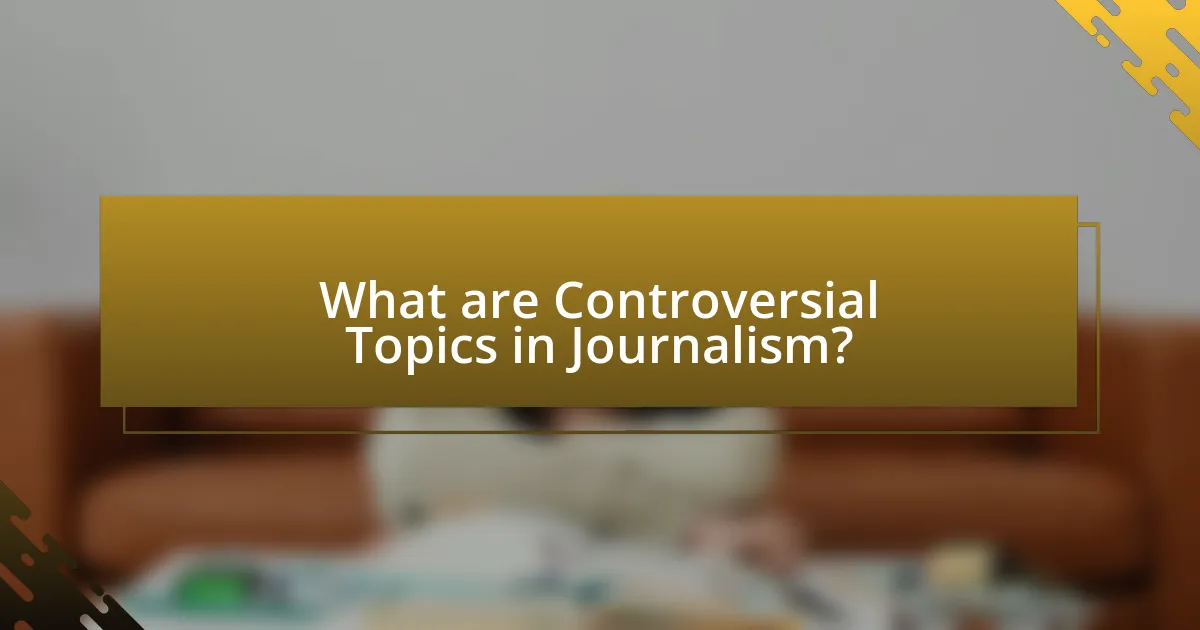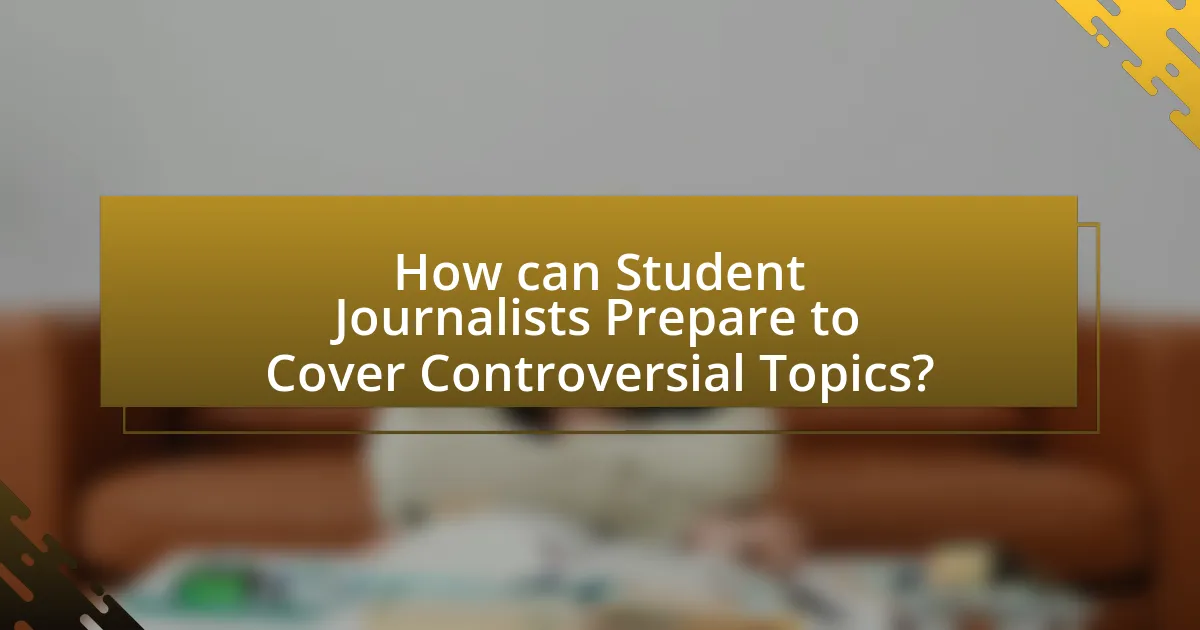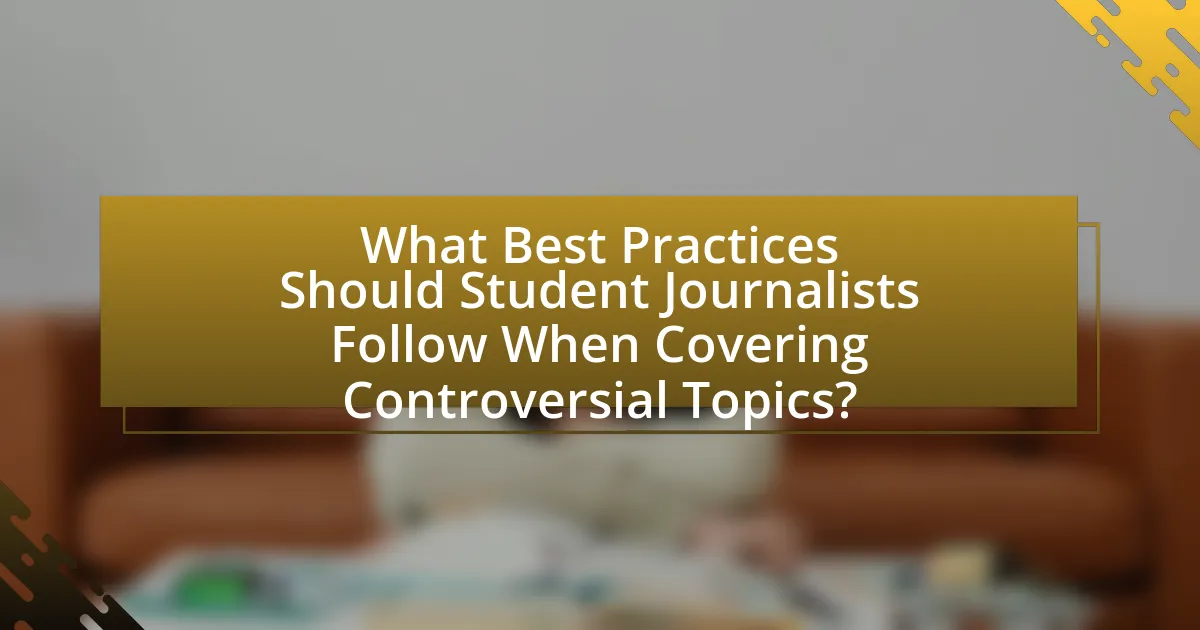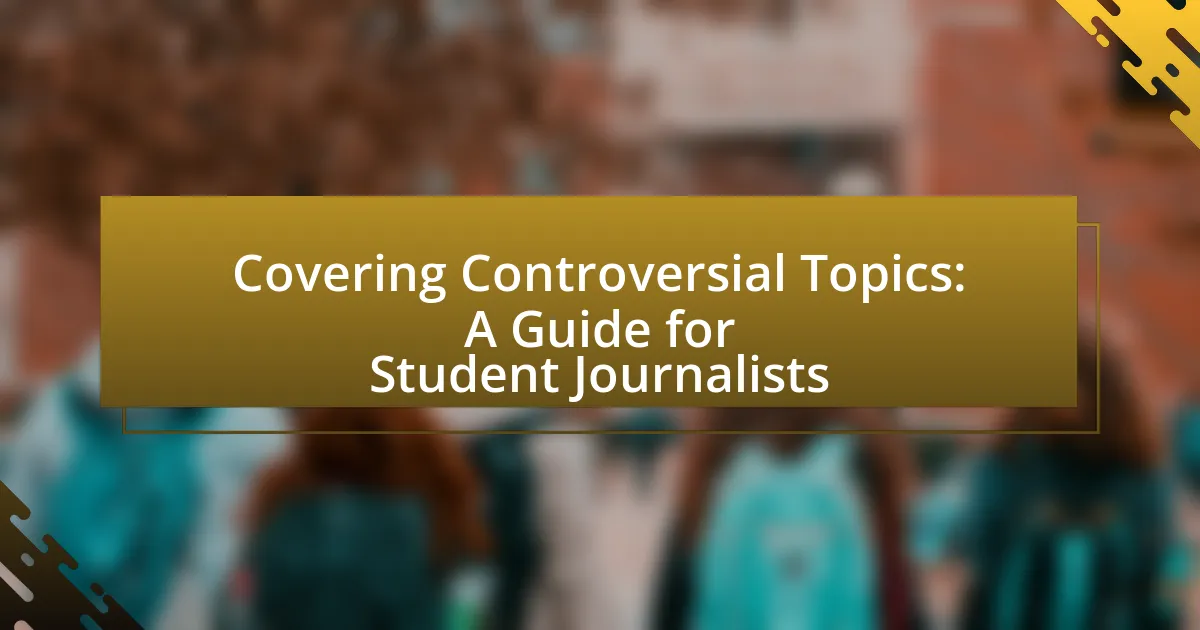The article “Covering Controversial Topics: A Guide for Student Journalists” provides an in-depth examination of the significance and challenges of reporting on contentious issues such as politics, race, and social justice. It emphasizes the importance of balanced reporting, ethical considerations, and the development of critical thinking skills among student journalists. Key topics include the impact of controversial subjects on public discourse, strategies for effective research and source identification, and the necessity of maintaining objectivity and transparency in journalism. The article also addresses common pitfalls and the consequences of misinformation, offering best practices for ethical and responsible reporting.

What are Controversial Topics in Journalism?
Controversial topics in journalism include issues that provoke strong public disagreement and debate, such as politics, race, immigration, climate change, and social justice. These subjects often elicit polarized opinions and can lead to significant societal impact, as evidenced by the extensive media coverage and public discourse surrounding events like the Black Lives Matter movement and the debates on immigration policy. The contentious nature of these topics necessitates careful reporting to ensure balanced perspectives and factual accuracy, as highlighted by the Society of Professional Journalists’ Code of Ethics, which emphasizes the importance of minimizing harm and acting independently.
Why is it important for student journalists to cover controversial topics?
It is important for student journalists to cover controversial topics because doing so fosters critical thinking and encourages civic engagement among their peers. By addressing contentious issues, student journalists provide a platform for diverse viewpoints, which enhances the educational experience and promotes informed discussions. Research indicates that engaging with controversial subjects can improve students’ analytical skills and understanding of societal dynamics, as evidenced by studies showing that students who participate in debates on contentious topics demonstrate higher levels of critical reasoning (National Communication Association, 2018).
What impact do controversial topics have on public discourse?
Controversial topics significantly shape public discourse by provoking debate and encouraging diverse viewpoints. These discussions often lead to increased engagement among citizens, as individuals feel compelled to express their opinions and challenge prevailing narratives. For instance, studies have shown that when issues such as climate change or immigration are debated, they can mobilize communities and foster civic participation, as evidenced by the rise in activism and public forums surrounding these subjects. This dynamic not only enhances democratic engagement but also highlights societal divisions, prompting deeper examination of underlying values and beliefs.
How can covering these topics enhance journalistic skills?
Covering controversial topics enhances journalistic skills by fostering critical thinking, improving research capabilities, and honing communication techniques. Engaging with contentious issues requires journalists to analyze multiple perspectives, which cultivates the ability to evaluate information critically. This process is supported by the necessity to conduct thorough research, as journalists must substantiate their claims with credible evidence, thereby enhancing their investigative skills. Furthermore, reporting on sensitive subjects demands clear and effective communication, as journalists must convey complex ideas to diverse audiences while maintaining objectivity. These experiences collectively prepare student journalists for real-world challenges, as evidenced by studies showing that journalists who engage with controversial topics develop a more nuanced understanding of ethical reporting and audience engagement.
What challenges do student journalists face when covering controversial topics?
Student journalists face significant challenges when covering controversial topics, including limited experience, potential backlash, and ethical dilemmas. Limited experience can hinder their ability to navigate complex issues effectively, as many student journalists are still developing their skills in research, interviewing, and writing. Potential backlash from peers, faculty, or the community can lead to harassment or social isolation, which may discourage them from pursuing certain stories. Ethical dilemmas arise when balancing the need for transparency and the responsibility to protect sources, especially in sensitive situations. These challenges can impact the quality and integrity of their reporting, making it crucial for student journalists to seek guidance and support from experienced mentors.
How can bias affect the reporting of controversial issues?
Bias can significantly distort the reporting of controversial issues by influencing the selection of facts, framing of narratives, and portrayal of subjects. When journalists hold personal or organizational biases, they may prioritize certain viewpoints over others, leading to an unbalanced representation of the issue. For instance, a study by the Pew Research Center found that media outlets often reflect the political leanings of their audiences, which can result in selective reporting that reinforces existing beliefs rather than providing a comprehensive view. This selective emphasis can mislead the public, shape perceptions, and ultimately affect public discourse on critical topics.
What ethical dilemmas arise in the coverage of controversial topics?
Ethical dilemmas in the coverage of controversial topics include balancing the public’s right to know with the potential harm that information may cause. Journalists often face the challenge of ensuring accuracy while avoiding sensationalism, which can distort public perception. For instance, reporting on sensitive issues like race or mental health can perpetuate stereotypes or stigmas if not handled with care. Additionally, the need for objectivity may conflict with personal beliefs, leading to biased reporting. The Society of Professional Journalists emphasizes the importance of minimizing harm and acting independently, highlighting that ethical journalism requires careful consideration of the impact on individuals and communities involved in controversial stories.

How can Student Journalists Prepare to Cover Controversial Topics?
Student journalists can prepare to cover controversial topics by conducting thorough research, understanding multiple perspectives, and developing strong ethical guidelines. Researching the topic involves gathering facts, statistics, and historical context to provide a well-rounded view. Understanding multiple perspectives requires engaging with various stakeholders, including those who support and oppose the issue, to ensure balanced reporting. Developing strong ethical guidelines is crucial, as it helps journalists navigate potential biases and maintain integrity in their reporting. For instance, the Society of Professional Journalists emphasizes the importance of seeking truth and reporting it, which is essential when dealing with contentious subjects.
What research methods are effective for understanding controversial topics?
Effective research methods for understanding controversial topics include qualitative interviews, surveys, content analysis, and case studies. Qualitative interviews allow for in-depth exploration of personal perspectives, while surveys can quantify public opinion on contentious issues. Content analysis helps identify themes and patterns in media coverage, and case studies provide detailed insights into specific instances of controversy. These methods are validated by their widespread use in social science research, demonstrating their effectiveness in capturing the complexity of public discourse surrounding controversial subjects.
How can student journalists identify credible sources?
Student journalists can identify credible sources by evaluating the authority, accuracy, objectivity, and currency of the information provided. They should prioritize sources that are recognized experts in their field, such as academic professionals or established organizations, as these entities typically have a track record of reliability. Additionally, verifying the information against multiple reputable sources can help confirm its accuracy. For instance, a study published in the Journal of Mass Communication & Journalism highlights that peer-reviewed articles and official reports are among the most credible sources available. By applying these criteria, student journalists can ensure that their reporting is based on trustworthy information.
What role does background knowledge play in reporting?
Background knowledge is essential in reporting as it enables journalists to provide context, accuracy, and depth to their stories. This foundational understanding allows reporters to critically analyze information, discern biases, and identify key issues relevant to the topic at hand. For instance, a journalist covering a controversial political issue must be familiar with the historical background, key players, and previous events related to that issue to present a well-rounded narrative. Research indicates that journalists with strong background knowledge are more likely to produce comprehensive and insightful reports, thereby enhancing the credibility of their work and fostering informed public discourse.
How can student journalists develop a balanced perspective?
Student journalists can develop a balanced perspective by actively seeking diverse viewpoints and verifying information from multiple sources. Engaging with various stakeholders, including experts, community members, and opposing sides of an issue, allows journalists to understand different angles and reduce bias. Research indicates that balanced reporting enhances credibility; for instance, a study by the Pew Research Center found that audiences trust news sources that present multiple perspectives. By incorporating these practices, student journalists can ensure their reporting is fair, accurate, and reflective of the complexities surrounding controversial topics.
What strategies can be used to present multiple viewpoints?
To present multiple viewpoints effectively, journalists can employ strategies such as balanced reporting, incorporating expert opinions, and utilizing direct quotes from diverse sources. Balanced reporting ensures that all sides of an issue are represented fairly, which is crucial in controversial topics. Incorporating expert opinions adds credibility and depth, as experts can provide insights that reflect various perspectives. Utilizing direct quotes allows for authentic voices to be heard, showcasing the range of opinions on the subject. These strategies are supported by journalistic standards that emphasize fairness and accuracy in reporting, ensuring that audiences receive a comprehensive understanding of the issue at hand.
How can journalists avoid sensationalism in their reporting?
Journalists can avoid sensationalism in their reporting by adhering to ethical standards and focusing on factual accuracy. This involves verifying information through multiple credible sources before publication, ensuring that the context is presented clearly and accurately. For instance, the Society of Professional Journalists emphasizes the importance of minimizing harm and acting independently, which helps maintain objectivity and prevents exaggeration. Additionally, journalists should strive to provide balanced perspectives, avoiding language that incites fear or outrage, as demonstrated by research from the Pew Research Center, which found that sensational headlines can distort public perception and trust in media.

What Best Practices Should Student Journalists Follow When Covering Controversial Topics?
Student journalists should prioritize accuracy, fairness, and sensitivity when covering controversial topics. They must thoroughly research facts and verify information from multiple credible sources to ensure the integrity of their reporting. Additionally, they should strive to present diverse perspectives, allowing for a balanced view that reflects the complexity of the issue. It is essential for student journalists to be aware of their own biases and to approach topics with an open mind, fostering an environment of respectful dialogue. Furthermore, they should adhere to ethical guidelines, such as obtaining consent when interviewing individuals involved in sensitive issues and being mindful of the potential impact their reporting may have on communities. These practices are supported by the Society of Professional Journalists’ Code of Ethics, which emphasizes the importance of accuracy, fairness, and accountability in journalism.
How can student journalists ensure ethical reporting?
Student journalists can ensure ethical reporting by adhering to established journalistic standards, such as accuracy, fairness, and accountability. They should fact-check all information before publication, ensuring that sources are credible and relevant. Additionally, student journalists must respect the privacy and dignity of individuals involved in their stories, obtaining consent when necessary. The Society of Professional Journalists’ Code of Ethics serves as a valuable guideline, emphasizing the importance of minimizing harm and acting independently. By following these principles, student journalists can maintain integrity and trustworthiness in their reporting.
What guidelines should be followed to maintain objectivity?
To maintain objectivity, journalists should adhere to guidelines such as verifying facts, presenting multiple viewpoints, and avoiding personal biases. Verifying facts ensures that the information reported is accurate and credible, which is essential in journalism. Presenting multiple viewpoints allows for a balanced representation of the topic, fostering a comprehensive understanding among the audience. Avoiding personal biases involves recognizing one’s own opinions and ensuring they do not influence the reporting process. These practices are supported by the Society of Professional Journalists’ Code of Ethics, which emphasizes accuracy, fairness, and impartiality in reporting.
How can transparency enhance credibility in reporting?
Transparency enhances credibility in reporting by fostering trust between journalists and their audience. When reporters openly disclose their sources, methodologies, and potential biases, they provide a clearer context for the information presented. This openness allows audiences to critically evaluate the reliability of the reporting. For instance, a study by the Pew Research Center found that 70% of Americans believe that transparency about sources increases trust in news organizations. By prioritizing transparency, journalists can build a more informed and engaged readership, ultimately reinforcing the integrity of their work.
What techniques can improve the quality of reporting on controversial topics?
Techniques that can improve the quality of reporting on controversial topics include thorough research, balanced perspectives, and ethical considerations. Thorough research ensures that journalists gather accurate information from credible sources, which is essential for presenting facts rather than opinions. Balanced perspectives involve including voices from all sides of the controversy, allowing for a more comprehensive understanding of the issue. Ethical considerations, such as sensitivity to the impact of reporting on individuals and communities, help maintain integrity and trustworthiness in journalism. These techniques collectively enhance the credibility and depth of reporting on contentious subjects.
How can storytelling be used effectively in controversial reporting?
Storytelling can be used effectively in controversial reporting by humanizing complex issues and presenting multiple perspectives. This approach allows journalists to engage audiences emotionally, fostering empathy and understanding. For instance, a study by the American Press Institute found that narratives that include personal stories can significantly increase reader engagement and retention of information. By weaving individual experiences into the broader context of a controversial topic, reporters can clarify the stakes involved and highlight the human impact, making the story more relatable and compelling.
What role does audience engagement play in covering controversial topics?
Audience engagement is crucial in covering controversial topics as it fosters dialogue and understanding among diverse perspectives. Engaging the audience allows journalists to gauge public sentiment, identify key concerns, and tailor their reporting to address these issues effectively. For instance, studies show that media outlets that actively involve their audience through comments, social media interactions, and surveys can create a more informed and responsive narrative, ultimately enhancing the credibility of the coverage. This engagement not only helps in mitigating backlash but also encourages a more nuanced exploration of the topic, as seen in cases like the coverage of social movements where audience feedback has shaped the discourse.
What are some common pitfalls to avoid in controversial journalism?
Common pitfalls to avoid in controversial journalism include lack of thorough research, failure to present multiple perspectives, and reliance on biased sources. Thorough research is essential; for instance, a study by the Pew Research Center found that 62% of Americans believe news organizations should strive for accuracy over speed. Presenting multiple perspectives ensures balanced reporting, as neglecting this can lead to accusations of bias, which undermines credibility. Additionally, using biased sources can skew the narrative; a report from the Media Bias/Fact Check indicates that reliance on partisan outlets can misinform the audience and damage journalistic integrity.
How can student journalists recognize and mitigate their biases?
Student journalists can recognize and mitigate their biases by engaging in self-reflection and seeking diverse perspectives. Self-reflection involves critically assessing their own beliefs and values that may influence their reporting. Research indicates that journalists who actively reflect on their biases are more likely to produce balanced coverage (Pew Research Center, 2021). Additionally, seeking diverse perspectives through interviews and collaboration with peers from different backgrounds can help counteract personal biases, as it exposes journalists to a wider range of viewpoints and experiences. This approach not only enhances the quality of reporting but also fosters a more inclusive narrative.
What are the consequences of misinformation in controversial reporting?
Misinformation in controversial reporting leads to significant consequences, including the erosion of public trust in media, the polarization of public opinion, and potential harm to individuals or communities. When journalists disseminate inaccurate information, it can create confusion and mislead audiences, resulting in a lack of informed decision-making. For instance, a study by the Pew Research Center found that 64% of Americans believe that fabricated news stories cause a great deal of confusion about the basic facts of current events. Additionally, misinformation can incite social unrest or violence, as seen in cases where false narratives about events have led to protests or riots. Thus, the ramifications of misinformation are profound, affecting societal cohesion and the integrity of journalistic practices.

Leave a Reply